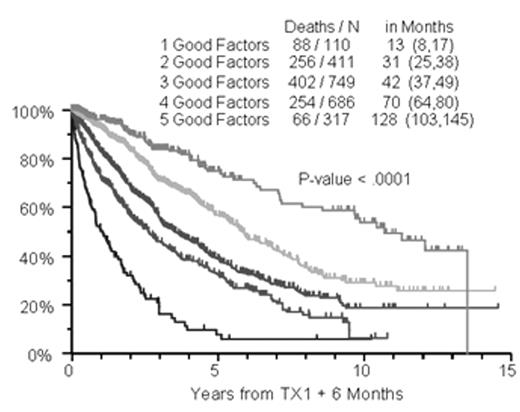Abstract
Background: AT’s have become the standard of care for MM. Long-term follow-up studies from large centers are critical to understand who benefits most and who should be considered for alternative treatment approaches.
Patients and Methods: 2,605 MM patients receiving at least one AT at the University of Arkansas were considered for this study. Kaplan-Meier analysis was used to estimate median event-free (EFS) and overall survival (OS). Cox regression was used to evaluate independent prognostic factors of EFS and OS from AT.
Results: Of the 2,605 patients, 891 were enrolled into front line Total Therapy (TT) protocols TT1/2/3 (TT); 1,012 were treated on protocols for previously treated patients (non-TT); and 702 were treated off protocol due to significant co-morbidities or patient/MD preference (non-P). Median EFS and OS for all patients are 29 mo and 51 mo; 10-yr EFS and OS are 18% and 23%; 12% survived >15yr. Features independently predicting superior survival included TT (HR 0.51, p<.001), absence of cytogenetic abnormalities (no CA) (HR 0.47, p<.001), timely application of 2nd transplant (< 6 months of 1st transplant) (HR 0.71, p<.001) as well as B2M < 3mg/L, CRP < 6mg/dL, albumin >=3g/dL, platelet count >=100.000/microL (all p<.001) and age <65yr (p=.008). The figure depicts survival (landmarked at 6 months after 1st transplant) according to the number of favorable features present of the 5 strongest predictors (TT, 2 transplants within 6 months, no CA, low B2M, low CRP).
Conclusion: This large single institution experience demonstrates that > 10yr survival can be accomplished in over one-half of the patients presenting without CA (14%), with low levels of B2M and CRP and receiving TT and timely 2nd autotransplant. The worst constellation affected 5% of all patients presenting with at most 1 good-risk feature whose 5-yr survival was only 8%. Collectively, these data should serve as a standard for MM investigators and patients alike, against which long-term outcome of newer treatments should be measured.
Author notes
Corresponding author


This feature is available to Subscribers Only
Sign In or Create an Account Close Modal